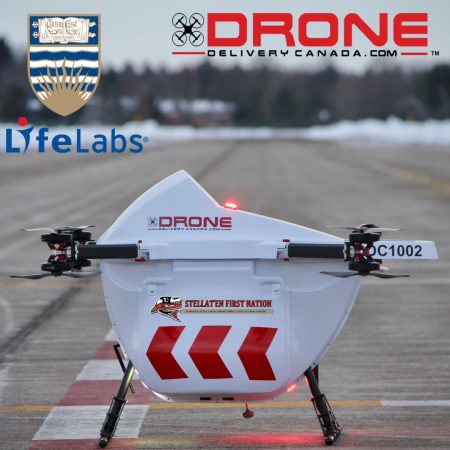
Drone Delivery Canada signs agreement with UBC for remote communities drone transportation initiative
by CM Staff
The solution will be used to transport a variety of cargo for the benefit of the Stellat'en First Nation and the Village of Fraser Lake

DRONE DELIVERY CANADA SIGNS AGREEMENT WITH UBC FOR REMOTE COMMUNITIES DRONE TRANSPORTATION INITIATIVE (CNW Group/Drone Delivery Canada Corp.)
TORONTO — Drone Delivery Canada Corp. has announced that, with the assistance of its sales agent Air Canada, it has signed a commercial, definitive agreement, effective July 15th, with the University of British Columbia (UBC) to deploy DDC’s patented drone delivery solution at the Stellat’en First Nation for UBC’s ‘Remote Communities Drone Transportation Initiative’ (DTI) program.
The project will enable defined-route deliveries utilizing DDC’s Sparrow drone and its DroneSpot takeoff and landing zones as well as additional drone flight infrastructure as required. The solution will be used to transport a variety of cargo for the benefit of the Stellat’en First Nation and the Village of Fraser Lake, located in Central Northern British Columbia, Canada.
DDC is expected to commence deployment of site infrastructure summer of 2021 and expects to begin providing drone delivery services under the agreement in the second half of 2021. The term of the agreement is 12 months. This deployment will be DDC’s fourth First Nations project and its first in British Columbia.
All operations will be conducted in accordance with appropriate Canadian regulations. Flights will be remotely monitored by DDC from its Operations Control Centre located in Vaughan, Ont.
“We’re pleased to have finalized our contract with Drone Delivery Canada and to be moving on to the next stage of this project. As we transition into a new phase of the COVID-19 pandemic, and with the risk of wildfires, we are looking forward to learning about how this innovative transportation technology can be used to meet community needs and help address inequities in access to health-care supplies and services,” said Michael Allard, Vice Dean, Health Engagement, UBC Faculty of Medicine, in a prepared statement.
“Based on the isolated location of our community and the needs of our residents, drone transport may enhance our access to COVID-19 testing and medication without traveling and endangering other members of our community,” said Chief Robert Michell of the Stellat’en First Nation, located about 100 kilometres west of Prince George. “The futuristic potential of this initiative is exciting. With drone technology, there is so much you can do.”
“We are pleased to sign this definitive agreement with UBC for their ‘Remote Communities Drone Transportation Initiative’ at the Stellat’en First Nation. The UBC Faculty of Medicine is a recognized global leader and we applaud their initiative to embrace drone delivery to benefit First Nations communities. We also look forward to working with LifeLabs as an important partner in this project. LifeLabs will be supporting the project to ensure an end-to-end solution by participating in data evaluations, sample logistics and training,” said Michael Zahra, President & CEO of DDC. “As an award-winning global leader, DDC is pleased with our continued business successes in the drone delivery industry.”
“Improved delivery times of essential supplies to remote locations can make all the difference in protecting the Stellat’en First Nation community and saving lives,” said Charles Brown, President and CEO of LifeLabs. “We are proud to be participating in this project that will also help to advance our knowledge for the future use of drone technology to transport clinical materials and samples for lab testing.”
Additionally, the Company announced that it is working on the next generation Sparrow delivery drone, in response to market demand. The current Sparrow has been successfully implemented at numerous commercial projects and will continue to be commercially available. The next generation Sparrow is already well into development and is expected to have the same range of 30km and payload capability of 4.5kg, along with next generation motor technology, next generation battery technology, touchless cargo drop functionality, an optional public announcement system and an optional aircraft parachute. The new functionality is expected to further address customer demands and evolving regulatory requirements.
The Company expects to reallocate Robin XL engineering resources to focus on completing the next generation Sparrow and Condor development, testing and commercialization as priorities, based on expected market demand in Canada and internationally. The Company will look to complete the Robin XL commercialization as market demands may indicate.